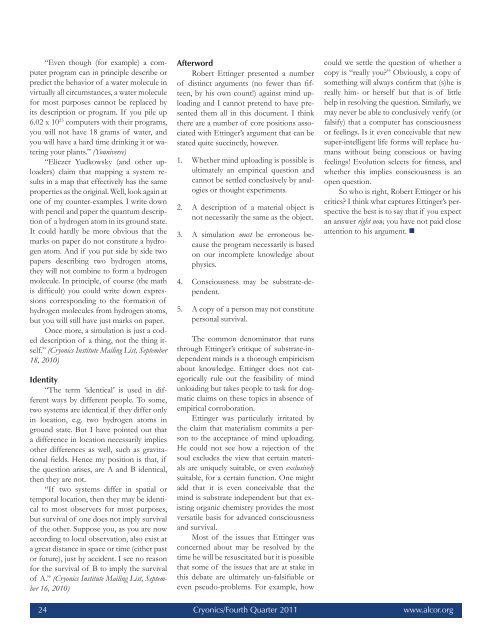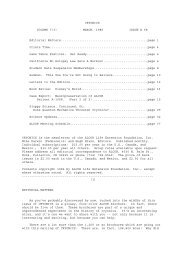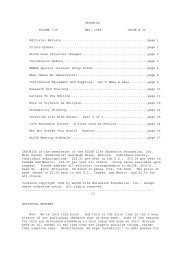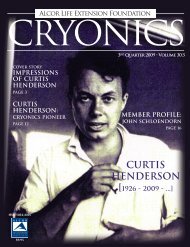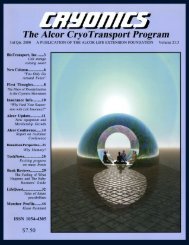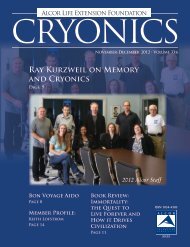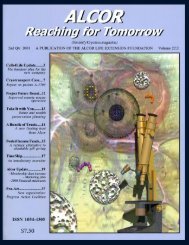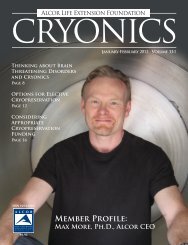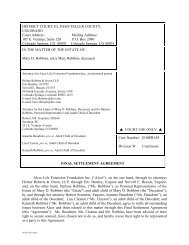Robert Ettinger - Alcor Life Extension Foundation
Robert Ettinger - Alcor Life Extension Foundation
Robert Ettinger - Alcor Life Extension Foundation
You also want an ePaper? Increase the reach of your titles
YUMPU automatically turns print PDFs into web optimized ePapers that Google loves.
“Even though (for example) a computer<br />
program can in principle describe or<br />
predict the behavior of a water molecule in<br />
virtually all circumstances, a water molecule<br />
for most purposes cannot be replaced by<br />
its description or program. If you pile up<br />
6.02 x 10 23 computers with their programs,<br />
you will not have 18 grams of water, and<br />
you will have a hard time drinking it or watering<br />
your plants.” (Youniverse)<br />
“Eliezer Yudkowsky (and other uploaders)<br />
claim that mapping a system results<br />
in a map that effectively has the same<br />
properties as the original. Well, look again at<br />
one of my counter-examples. I write down<br />
with pencil and paper the quantum description<br />
of a hydrogen atom in its ground state.<br />
It could hardly be more obvious that the<br />
marks on paper do not constitute a hydrogen<br />
atom. And if you put side by side two<br />
papers describing two hydrogen atoms,<br />
they will not combine to form a hydrogen<br />
molecule. In principle, of course (the math<br />
is difficult) you could write down expressions<br />
corresponding to the formation of<br />
hydrogen molecules from hydrogen atoms,<br />
but you will still have just marks on paper.<br />
Once more, a simulation is just a coded<br />
description of a thing, not the thing itself.”<br />
(Cryonics Institute Mailing List, September<br />
18, 2010)<br />
Identity<br />
“The term ‘identical’ is used in different<br />
ways by different people. To some,<br />
two systems are identical if they differ only<br />
in location, e.g. two hydrogen atoms in<br />
ground state. But I have pointed out that<br />
a difference in location necessarily implies<br />
other differences as well, such as gravitational<br />
fields. Hence my position is that, if<br />
the question arises, are A and B identical,<br />
then they are not.<br />
“If two systems differ in spatial or<br />
temporal location, then they may be identical<br />
to most observers for most purposes,<br />
but survival of one does not imply survival<br />
of the other. Suppose you, as you are now<br />
according to local observation, also exist at<br />
a great distance in space or time (either past<br />
or future), just by accident. I see no reason<br />
for the survival of B to imply the survival<br />
of A.” (Cryonics Institute Mailing List, September<br />
16, 2010)<br />
Afterword<br />
<strong>Robert</strong> <strong>Ettinger</strong> presented a number<br />
of distinct arguments (no fewer than fifteen,<br />
by his own count!) against mind uploading<br />
and I cannot pretend to have presented<br />
them all in this document. I think<br />
there are a number of core positions associated<br />
with <strong>Ettinger</strong>’s argument that can be<br />
stated quite succinctly, however.<br />
1. Whether mind uploading is possible is<br />
ultimately an empirical question and<br />
cannot be settled conclusively by analogies<br />
or thought experiments.<br />
2. A description of a material object is<br />
not necessarily the same as the object.<br />
3. A simulation must be erroneous because<br />
the program necessarily is based<br />
on our incomplete knowledge about<br />
physics.<br />
4. Consciousness may be substrate-dependent.<br />
5. A copy of a person may not constitute<br />
personal survival.<br />
The common denominator that runs<br />
through <strong>Ettinger</strong>’s critique of substrate-independent<br />
minds is a thorough empiricism<br />
about knowledge. <strong>Ettinger</strong> does not categorically<br />
rule out the feasibility of mind<br />
unloading but takes people to task for dogmatic<br />
claims on these topics in absence of<br />
empirical corroboration.<br />
<strong>Ettinger</strong> was particularly irritated by<br />
the claim that materialism commits a person<br />
to the acceptance of mind uploading.<br />
He could not see how a rejection of the<br />
soul excludes the view that certain materials<br />
are uniquely suitable, or even exclusively<br />
suitable, for a certain function. One might<br />
add that it is even conceivable that the<br />
mind is substrate independent but that existing<br />
organic chemistry provides the most<br />
versatile basis for advanced consciousness<br />
and survival.<br />
Most of the issues that <strong>Ettinger</strong> was<br />
concerned about may be resolved by the<br />
time he will be resuscitated but it is possible<br />
that some of the issues that are at stake in<br />
this debate are ultimately un-falsifiable or<br />
even pseudo-problems. For example, how<br />
could we settle the question of whether a<br />
copy is “really you?” Obviously, a copy of<br />
something will always confirm that (s)he is<br />
really him- or herself but that is of little<br />
help in resolving the question. Similarly, we<br />
may never be able to conclusively verify (or<br />
falsify) that a computer has consciousness<br />
or feelings. Is it even conceivable that new<br />
super-intelligent life forms will replace humans<br />
without being conscious or having<br />
feelings! Evolution selects for fitness, and<br />
whether this implies consciousness is an<br />
open question.<br />
So who is right, <strong>Robert</strong> <strong>Ettinger</strong> or his<br />
critics? I think what captures <strong>Ettinger</strong>’s perspective<br />
the best is to say that if you expect<br />
an answer right now, you have not paid close<br />
attention to his argument. �<br />
24 Cryonics/Fourth Quarter 2011 www.alcor.org


